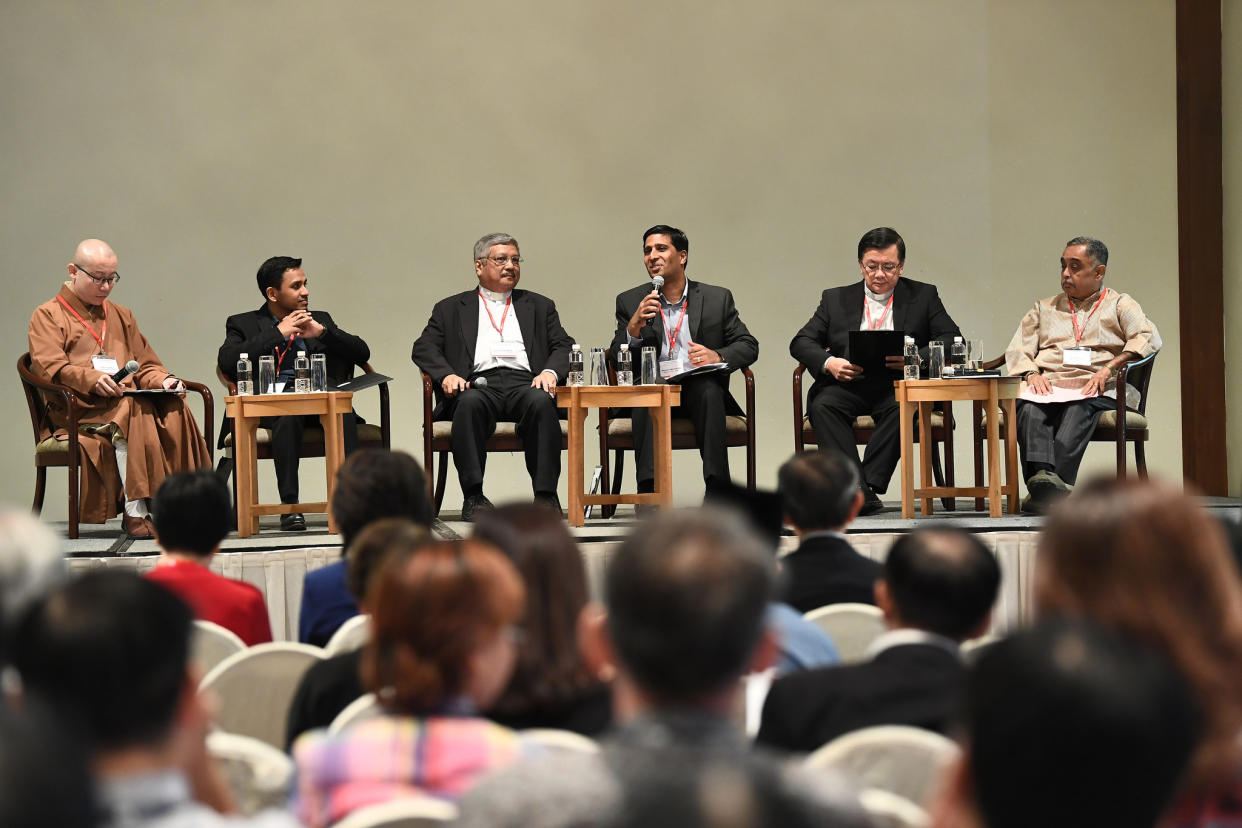Singapore faiths and government should work closely to curb extremist religious speakers: forum

Local religious leaders have called for a stronger partnership between themselves and the government to prevent foreign religious speakers with deviant views from coming into Singapore.
They were speaking at a one-day forum, organised by the Institute of Policy Studies, on the role of religious leaders and the state in cultivating religious harmony in Singapore at the Furama RiverFront Hotel on Tuesday (3 July).
Venerable Shi You Wei, Chairman of Education Committee, Singapore Buddhist Federation, who called the issue “a big challenge”, noted that speakers engaged by companies or individuals fall out of control of the Buddhist Federation.
The National Council of Churches of Singapore likewise does not have full control over speakers who enter Singapore, said Dr Robert Solomon, Bishop Emeritus of the Methodist Church in Singapore.
As such, there is a need for a collaboration between the government and religious communities. The government can consult the various religious leaders if there is a potential “problem preacher” who is planning to come to Singapore and obtain their agreement, Dr Solomon suggested.
“It’s a much stronger message, that these people are kept out not only by the authorities but also by the faith communities,” he added.
The religious leaders’ comments came after several foreign preachers were barred from entering Singapore last year for their divisive views on religion.
Among them, two Islamic preachers, Ismail Menk and Haslin Baharim, were initially engaged to preach on a religious-themed cruise departing and ending in Singapore last November. Separately, two foreign Christian preachers have had their applications to speak in Singapore rejected as they had made “denigrating and inflammatory comments” of other religions, said the Ministry of Home Affairs last September.
At the forum, Rev Monsignor Philip Heng, Vicar General for Finance and Administration and Inter-religious Relations at the Roman Catholic Archdiocese of Singapore, called for religious leaders to do more in the vetting process for foreign speakers.
“Minister of Law K Shanmugam made it clear when he spoke to religious leaders that while the government may have certain procedures in place to check on foreign speakers, the primary responsibility is on religious leaders to screen out the speakers before we even allow them to process their applications,” said Heng.
For instance, foreign speakers must get clearance from within the Catholic church, be recognised and also not have preached extreme views overseas. Those who come to Singapore for religious purposes, such as celebrating the Eucharist, must get clearance from the chancery office for their participation, he added.
In a dialogue session on the same day, Wong Kan Seng, former Deputy Prime Minister and former Minister for Home Affairs, stressed that the state doesn’t need to come in unless it has to nip a problem in the bud.
“We do not deliberately get involved with the religion, leave it to the religious leaders. The State’s job is to make sure we have an environment that is available for the people to pursue their lives,” he said.
Richard Magnus, adjunct professor at the Singapore University of Social Sciences’ School of Law, stressed that the government has the responsibility and authority to prevent people from engaging in acts in the name of religion if it were to threaten public order.
Other speakers spoke about the challenges of maintaining Singapore’s secular nature.
Mohammad Alami Musa, president of Majlis Ugama Islam Singapura, suggested that the state should broaden the legal framework to deepen state-religion engagement as well as protecting secularism.
Describing Singapore’s secular system as religious-friendly “secularism with a soul”, he called for moderation to ensure that it does not go the extreme way, such as in France. Failing to do so could cause tensions within the religious communities, said Alami, who is also head of studies in the Inter-religious Relations in Plural Societies programme at the S Rajaratnam School of International Studies.
Noting that one in five Singaporeans have no religion, Dr Solomon stressed the need to guard against liberal secularism from the West, where people have fewer qualms about making fun of religious leaders and deities.
“If we import that, we will have problems. (It is) something to think about, how religious communities relate to secularists,” he said.
Other Singapore stories:
PHOTOS: Seletar Airport’s new passenger terminal set to open by end-2018
PHOTOS: Malaysia’s ex-PM Najib arrives at Kuala Lumpur courthouse to face charges
Male nurse who posed as doctor to molest patient jailed 7 months


